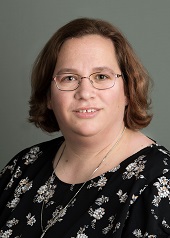Faculty Profile

-
Sarah Tersey
-
-
Section of Endocrinology, Diabetes and Metabolism
-
Research Professor
-
stersey@bsd.uchicago.edu
-
-
Academic Interests
-
Dr. Sarah Tersey is an islet biologist whose research focuses on the role of the ß-cell in the development of type 1 and type 2 diabetes. The primary goal of her research focuses on understanding the molecular pathways that play a role in the development of diabetes. Specifically, pathways that include the enzymes 12-lipoxygnease and deoxyhypusine synthase. By using inhibitors against these pathways or creating genetic deletions of either of these genes, Dr. Tersey has shown that diabetes can be prevented. A second major focus of my research is the development of biomarkers that will best predict the likelihood of any one individual’s risk to develop type 1 diabetes. Within this concept, she demonstrated that the dysfunction of the pancreatic islet precedes the onset of type 1 diabetes. This research has changed the standard dogma of the islet as a silent bystander to the immune system, to the new way of thinking – that the pancreatic islet is a major player in its own demise during the pre-course of type 1 diabetes.
Clinical Interests
-
Publications
-
-
Tersey SA, Nishiki Y, Templin AT, Cabrera SM, Stull ND, Colvin SC, Evans-Molina C, Rickus JL, Maier B, Mirmira RG. (2012) Islet beta cell endoplasmic reticulum stress precedes the onset of type 1 diabetes in the non-obese diabetic mouse model. Diabetes 2012 61(4): 818-27. PMCID: PMC3314371.
-
Hernandex-Perez M, Chopra G, Fine J, Anderson RM, Benjamin C, Nalder JL, Maloney DJ, Tersey SA, Mirmira RG. (2017) Inhibition of 12/15-Lipoxygenase Protects Against ß-Cell Oxidative Stress and Glycemic Deterioration in Mouse Models of Type 1 Diabetes. Diabetes, 66(11):2875-87. PMID: 28842399
-
Levasseur EM, Yamada K, Wu W, Piñeros Alvarez AR, Syed F, Orr KS, Mastracci TL, Mosley AL, Liu Y, Bernal-Mizrachi E, Alonso L, Scott D, Garcia-Ocaña A, Tersey SA, Mirmira RG. Hypusine biosynthesis in ß cells links polyamine metabolism to facultative cellular proliferation to maintain glucose homeostasis. Science Signaling, accepted.
Training
-
-
PhD, 2005, University of Massachusetts, Amherst, Animal Biotechnology and Biomedical Sciences
-
Postdoctoral Fellow, 2007, Massachusetts General Hospital, Harvard Medical School
-
Postdoctoral Fellow, 2008, University of Virginia, Endocrinology
